|
|
|
Sort Order |
|
|
|
Items / Page
|
|
|
|
|
|
|
| Srl | Item |
| 1 |
ID:
087393
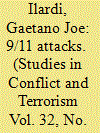

|
|
|
|
|
| Publication |
2009.
|
| Summary/Abstract |
The 9/11 attacks on New York and Washington, D.C. were undoubtedly the most brazen and shocking terrorist attacks conducted by a sub-state group in history. Al Qaeda's capacity to achieve this outcome depended in large part on its meticulous intelligence and counterintelligence preparations. These activities allowed Al Qaeda to exert a strong measure of control over its operating environment, leading to a confidence that events would unfold as planned. Moreover, intelligence and counterintelligence allowed Al Qaeda to form highly accurate and realistic assessments of its environment, an outcome that helps to dispel notions of an organization consumed by a level of fanaticism that distorts its perception of reality, or else frustrates its capacity to engage in rational decision making
|
|
|
|
|
|
|
|
|
|
|
|
|
|
|
|
| 2 |
ID:
084998
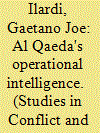

|
|
|
|
|
| Publication |
2008.
|
| Summary/Abstract |
For Al Qaeda, intelligence is a critical operational resource. Its vigorous collection, scrutiny, and dissemination within the organization have proven fundamental to its capacity to engage in carefully crafted acts of terrorism. In addition to its operational utility, intelligence fulfills a range of other functions, including an ability to contribute to Al Qaeda's symbolic goals and elevate the confidence of operatives and leadership alike. Ultimately, however, Al Qaeda's collection and use of detailed intelligence reveals a capacity to calculate the consequences of alternative courses of action, thereby helping to dispel notions of an irrationality or fanaticism in which decision making is somehow removed from reality.
|
|
|
|
|
|
|
|
|
|
|
|
|
|
|
|
| 3 |
ID:
087056
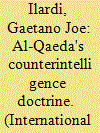

|
|
|
|
|
| Publication |
2009.
|
| Summary/Abstract |
It is up the leadership and individuals to make continuous effort to reach a perfect security image that could achieve the required target. It is up to each group to keep developing and innovating security measures that suit the development of the enemy's abilities to benefit from previous trials and renewed experiences and to be familiar with whatever is new with regards to the opposing security of the group's movement.
|
|
|
|
|
|
|
|
|
|
|
|
|
|
|
|
| 4 |
ID:
160137
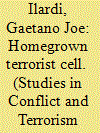

|
|
|
|
|
| Summary/Abstract |
On 10 October 2004, an improvised explosive device was detonated in bush land in the vicinity of Mount Disappointment on the outskirts of Melbourne, Australia. A relatively small device, it was assembled and detonated by one of the two men present, a Victoria Police officer and undercover operative known as Security Intelligence Officer 39, or SIO39. The other person was the leader of a homegrown terrorist cell, who in the months preceding had assembled a group of a dozen individuals who became the subject of Australia's largest counterterrorism investigation known as Operation Pendennis. This article, which is based on in-depth interviews with SIO39, provides unique insights into a range of activities and behaviors peculiar to this cohort. Commencing his association with the group early in its development, SIO39 was privy to some of its key evolutionary stages, from a collection of individuals meeting more or less in the open, to a clandestine body that clearly harbored terrorist intent and undertook a number of overt acts to advance its violent objectives.
|
|
|
|
|
|
|
|
|
|
|
|
|
|
|
|
| 5 |
ID:
123344
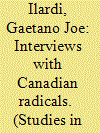

|
|
|
|
|
| Publication |
2013.
|
| Summary/Abstract |
Based on in-depth interviews with seven Canadian radicals in 2011, this article provides a detailed and nuanced insight into these men's personal journeys into, and in some cases, exit from, the world of radical Islam. Reflecting on their motivation, emotions, and decision-making processes, these men's stories demonstrate that the radicalization experience is anything but straightforward in the sense of there being a single and unambiguous motivation that spurs individuals on. Rather, they reveal that they were drawn to, and remained involved with, the world of extremism for a variety of reasons, not all of which necessarily related to the existence of grievances, real or imagined. Moreover, the relative importance of these drivers appeared to be in a state of flux, depending on an individual's needs or circumstances at any given time. Indeed, the highly idiosyncratic and temporally specific nature of the radicalization process, as demonstrated by these men's accounts, does not bode well for government and law enforcement efforts to anticipate specific cases of radicalization.
|
|
|
|
|
|
|
|
|
|
|
|
|
|
|
|
| 6 |
ID:
096701
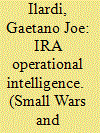

|
|
|
|
|
| Publication |
2010.
|
| Summary/Abstract |
This article will seek to provide a detailed examination of the IRA's operational intelligence methodologies. Providing not only a lengthy discussion on the organization's intelligence collection protocols, it will also examine the interplay between intelligence and IRA decision-making. It will be contended that intelligence's influence resided in its ability to introduce a strong element of predictability into the IRA's decision-making process. This depended on an ability to construct a detailed intelligence picture of the target and its geographical milieu so as to minimize the likelihood of volunteers encountering unforeseen circumstances that could adversely affect planned or anticipated outcomes.
|
|
|
|
|
|
|
|
|
|
|
|
|
|
|
|
| 7 |
ID:
094077
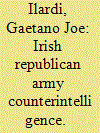

|
|
|
|
|
| Publication |
2010.
|
| Summary/Abstract |
The collection of intelligence, whether by the Irish Republican Army (IRA) or the British security forces, became a means and, indeed, an extension of the struggle by which each side sought to assert its dominance and control over the direction and tempo of the Northern Ireland conflict. The implications of this intelligence war were far-reaching, impinging on almost every aspect of the conflict. In addition to its more obvious impact, such as its capacity to determine the outcome of individual operations, intelligence could also influence the conflict in more subtle ways. For instance, the security force's ability to acquire quality intelligence minimized the need to conduct house searches, a practice which proved immensely unpopular among the Nationalist community. From the earliest stages of the Troubles, both sides were engaged in a do or die struggle to control the flow of intelligence. For each, intelligence was crucial to assuring certainty and control for itself, while depriving both from the enemy. For both sides this became the function of counterintelligence.
|
|
|
|
|
|
|
|
|
|
|
|
|
|
|
|
| 8 |
ID:
193070
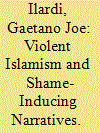

|
|
|
|
|
| Summary/Abstract |
Shame avoidance or repair can serve as a powerful source of motivation, a view shared by violent Islamist (VI) organizations such as the Islamic State of Iraq and the Levant (ISIL) and al-Qaeda, whose respective propaganda activities seek to shame sympathizers into action by dislodging them from positions of inactivity or indecisiveness. Utilizing concepts contained in Benford and Snow’s notion of experiential commensurability, this article will examine how VI organizations seek to induce shame among their targets of mobilization by facilitating comparison and instilling a sense of accountability.
|
|
|
|
|
|
|
|
|
|
|
|
|
|
|
|
|
|
|
|
|